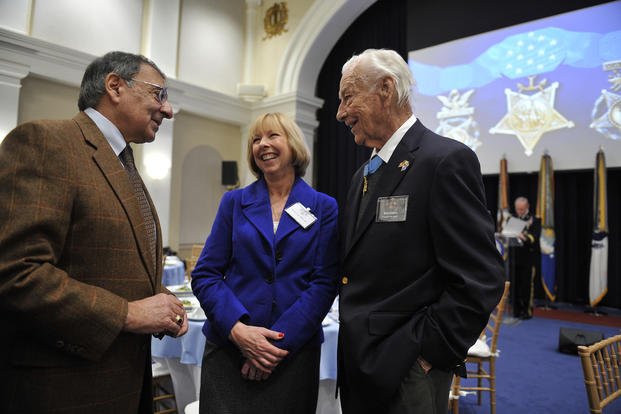Sgt. Walt Ehlers was well-known for his heroic actions on D-Day, for which he was awarded the Congressional Medal of Honor. What he was much less known for was his continued service as a Department of Veterans Affairs employee and veteran benefits advocate.
One of Ehlers' close friends once told me a story that I found more unbelievable than his selfless actions in Normandy. In 1964, the White House was planning to host a memorial service in recognition of the 20th anniversary of the D-Day landing.
A White House representative called the VA hospital in Southern California, looking to reach Ehlers in order to invite him to the ceremony. The representative was successful in reaching Ehlers, but the phone call caused quite the commotion among his VA colleagues, "Why on Earth is the White House calling you, Walt?"
After returning home from the war, Ehlers went on to work at the Department of Veterans Affairs for 20 years, and he never told any of his colleagues that he received the Medal of Honor. It's hard to imagine that happening today. Talk about leaving behind a legacy of humility and service.
The most recent generation of returning veterans has been described as the "next Greatest Generation." Personally, I feel it's a bit premature to label us as such.
What made our grandparents the Greatest Generation wasn't only their heroic exploits on the battlefields in Europe and across the Pacific, but it was also their lasting contributions to our society after returning home from the war.
Post 9/11 veterans have carried the burden of our nation's two longest wars, simultaneously, and have made unbelievable sacrifices that would undoubtedly earn the respect of seasoned warriors from any era. However, we are just getting started back here at home, and we still have a long way to go before leaving behind a lasting legacy equal to that left behind by our grandparents.
The question that Post 9/11 vets need to ask themselves is, "What do you want your legacy to be?" We can no longer control what happens in Iraq and Afghanistan. And it will take decades before historians can look back and accurately assess the impact of our blood, sweat and tears in the region.
What we can control is what's in front of us right now, and our ability to take the lessons that we learned serving our country overseas, and apply them to make our communities better back here at home.
Many of us veterans are lost when we return home. We're not sure what to do and oftentimes end up chasing jobs, opportunities and ideas on a whim, only to find ourselves back at Square 1 when things don't pan out and we lose interest.
Leaving behind a legacy doesn't mean building a huge empire or becoming famous. Ehlers lived a very humble life as a public servant and dedicated himself to a mission that he was passionate about and served and improved his community, as well as the people and family around him.
It is incredibly important for returning veterans to take the time to think about how they will continue to serve our country at home. How can we take the unique skills that we learned fighting our nation's battles to make our communities better? What is most meaningful to us? How do we want to be remembered? How can we build and leave behind a lasting legacy for the next generation?
Our grandparents are, without a doubt, the Greatest Generation. Walt Ehlers exemplified the courage and selflessness that set that generation apart from all the rest. I like to think that we will become the next greatest, but we still have a long way to go.
Michael Abrams is an Afghanistan veteran and founder of FourBlock, a veteran career development program based in New York. He is the author of "Business Networking for Veterans" and an adjunct professor at Fordham University.
Find the Right Veteran Job
Whether you want to polish your resume, find veteran job fairs in your area or connect with employers looking to hire veterans, Military.com can help. Subscribe to Military.com to have job postings, guides and advice, and more delivered directly to your inbox.











